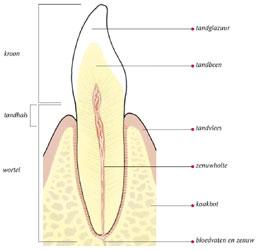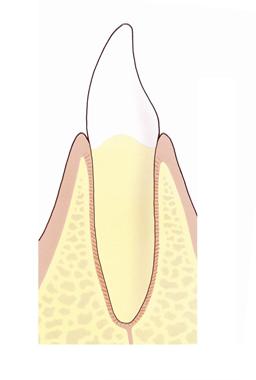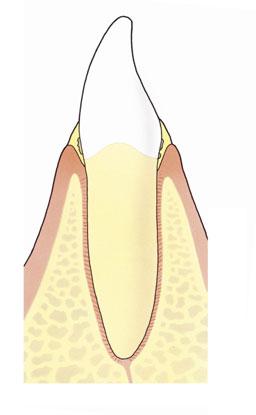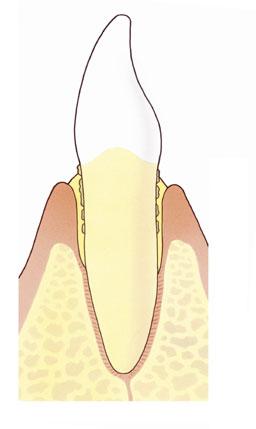Sensitive tooth necks
Sensitive tooth necks
Receding gums
In a healthy mouth, the gums lie neatly around the teeth. Sensitive tooth necks only occur when the gums have receded. Without receding gums, this sensitivity is not possible. Once gums have receded, they will not come back.
Exposed tooth necks
Pain when eating or drinking hot or cold products? Or just if you take something sour or sweet? Exposed tooth necks are probably the problem. When the gums recede, the neck and root of the tooth are exposed. There is no enamel on the neck and root of the tooth. As a result, the tooth is very sensitive to influences such as hot, cold, sweet and sour. Holes also easily form in the exposed part. Proper brushing and a good diet are very important to deal with sensitivity.
What causes the gums to recede?
If you brush too vigorously, for too long, with too much pressure or with a hard toothbrush, you can literally brush away your gums. Inflamed gums (periodontitis) are also a cause of receding gums. Inflamed gums are caused by poor oral hygiene.

Section of a tooth with the gums receding
Inflamed gums
Inflamed gums (gingivitis) can lead to receding gums.
Healthy gums are pink, tight around the teeth and do not bleed when you brush your teeth.

Healthy gums
Red, swollen or bleeding gums usually indicate inflamed gums. Plaque on the transition from your gums to your tooth and the plaque between your teeth cause inflamed gums. This stage is called gingivitis.

Gingivitis
If you don't remove plaque properly, the bacteria in the plaque will further inflame your gums. Unremoved plaque calcifies into tartar. New plaque easily adheres to tartar.

tartar
There is a small space (pocket) between the tooth and the gums. Because inflamed gums become detached from the teeth and molars, that space becomes deeper. The inflammation in the gum line can spread towards the jaw bone. This causes the gums to loosen even further. The inflammation causes the fibers to break and the jawbone to break down. Consequence? Even deeper pockets. In this, the dental plaque partially calcifies into tartar. This progressive inflammation with breakdown of fibers and jaw bone is called periodontitis.

Periodontitis
Due to the inflamed gums, the teeth and molars have become loose and the gums have receded. The root is partially exposed. Periodontitis can be treated, which restores healthy gums. Once gums have receded, they will not come back.

Receding gums
What causes the pain in sensitive tooth necks?
Teeth consist of a crown and one or more roots. The crown is the part you see and it has a strong layer of glaze. You cannot see the roots and have no glaze. As soon as the gums recede, a piece of the tooth without enamel is exposed. This porous material is dentine. There are channels in dentin that are connected to the nerve cavity inside the tooth. If the gums close the canals, you will not notice it. If the gums are gone, warm, cold, sweet or sour stimuli will cause the moisture in those channels to move. That movement irritates the nerves and thus causes the pain.
How can you prevent sensitive tooth necks?
Good oral hygiene can prevent tooth neck sensitivity. If you don't brush too vigorously and make sure your gums don't get inflamed, you won't have to deal with this. This means that you must remove all plaque from and between your teeth every day. Therefore, brush your teeth twice a day with a fluoride toothpaste. A good brushing takes two minutes, is done carefully, not too vigorously and with a soft toothbrush. Also clean the spaces between your teeth daily with toothpicks, brushes or dental floss.
What can you do yourself against sensitive tooth necks?
Brush properly
Since exposed tooth necks and roots are not protected by enamel, caring for them is especially important. Not only to prevent holes in the roots, but also to minimize sensitivity. So keep brushing, even if you are in pain. When you brush with toothpaste, you put a protective layer on the teeth. This makes it less easy for stimuli to reach the nerves in the tooth. Consequence? Less pain! But acidic liquids easily wash away this layer. Then the pain returns. Sometimes rinsing with a fluoride rinse aid can also help. Discuss this with your dentist or dental hygienist.
Change diet
To limit sensitivity, it may be important to change your diet. For example, do you drink a lot of juices or soft drinks (sour) or do you eat a lot of citrus fruit? Then the unprotected dentine wears away easily. The entrances to the channels are getting wider. This allows the stimuli to easily pass through the dentin. Therefore, limit the number of eating and drinking moments to a maximum of seven times a day. Choose three main meals and a maximum of four snacks in between. Eat acidic fruit no more than once or twice a day and drink soft drinks and other acidic drinks in moderation. Do not eat or drink acidic products one hour before brushing your teeth. Acids weaken the dentine, making it easy to brush away. If you do not change your diet, the sensitivity cannot be treated and will continue to get worse.
What can the dentist do against sensitive tooth necks?
The dentist or dental hygienist can only tackle the sensitivity together with you. Depending on the cause, you may need to improve your oral hygiene, change your brushing style, or change your diet. The dentist can apply a varnish with extra fluoride. This treatment works temporarily. In case of serious complaints, the dentist can provide the exposed necks with a filler, for example composite. The application must be done very accurately. The treatment is often not painless and is therefore often done with a local anesthetic. The dentist must blow the tooth dry and apply a cold liquid.
Are there toothpastes that help against dental sensitivity?
As soon as you brush your teeth and necks with toothpaste, you apply a protective layer. This can block the passage in the dentin to the nerve cavity. Then the sensitivity may temporarily decrease slightly. Some toothpastes are specially formulated to treat sensitive tooth necks. Many patients benefit from its use. But the results are not always successful. The benefits of the toothpaste can be negated by your eating or drinking behavior (acidic) or by the abrasive effect of toothpaste. All toothpastes have a different effect. Therefore, try out different toothpastes against sensitive tooth necks.
Control and guidance for sensitive tooth necks
Discuss your tooth neck sensitivity with your dentist or dental hygienist. Agree how often you will visit for check-ups and guidance. Do you have further questions? Then contact your dentist or dental hygienist.